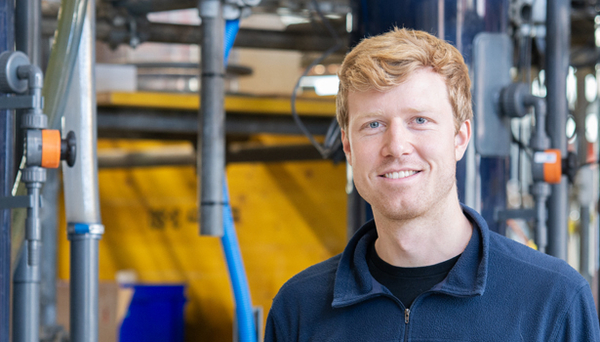Department Process Engineering
Prizewinning master’s thesis
April 9, 2024 |
The Swiss Waters Protection Ordinance stipulates the removal of micropollutants in selected wastewater treatment plants, in a process that is carried out in some of the plants using activated carbon filters. “However, the removal process is not yet fully understood. Machine learning could help to decipher complex relationships between different variables,” says Nicolas Neuenhofer, who trained as a classical environmental engineer at the Technical University of Darmstadt and therefore had little experience of machine learning methods during his studies. “Afterwards, I felt I needed to get to grips with the topic.”
Greater headway than expected
He was therefore very interested in the master’s thesis advertised by Andreas Frömelt, head of the “Data & Information” research group in the Process Engineering department. “The aim was to test the extent to which machine learning methods can help us expand our understanding of the process,” says Andreas. “This understanding is necessary in order to develop a reliable and generally applicable model of activated carbon filtration.” In this context, Nicolas adds: “A model can also be used to test operating strategies with a view to optimising the elimination of micropollutants.”
“If you want to model something using machine learning, you need a lot of data,” says Nicolas. However, the available stock of data is very small for micropollutants in wastewater because the measurements are technically complex – and costly. He therefore had to resort partly to auxiliary parameters that correlated well with micropollutants in the analysed data. “Nico made much greater headway than expected,” says Andreas. “He brought in new ideas and identified techniques that were a perfect fit for the model.”
Just the right amount of freedom
The Oswald Schulze Foundation in Aachen also found Nicolas’ master’s thesis outstanding and awarded it third prize in 2024—a distinction that comes with prize money of 1,000 euros. “The prize is also a reward for the tough final straight,” says Nicolas. “Credit for the award also goes to Andi, who supported me and gave me just the right amount of freedom to do a lot myself but never get lost in the process.”
Since May 2023, Nicolas has been working as a scientific collaborator in the Urban Water Management department.
Original Publication
Masterarbeit von Nicolas Neuenhofer: «Machine Learning Based Modeling of Activated Carbon Filters for Micropollutant Removal»

